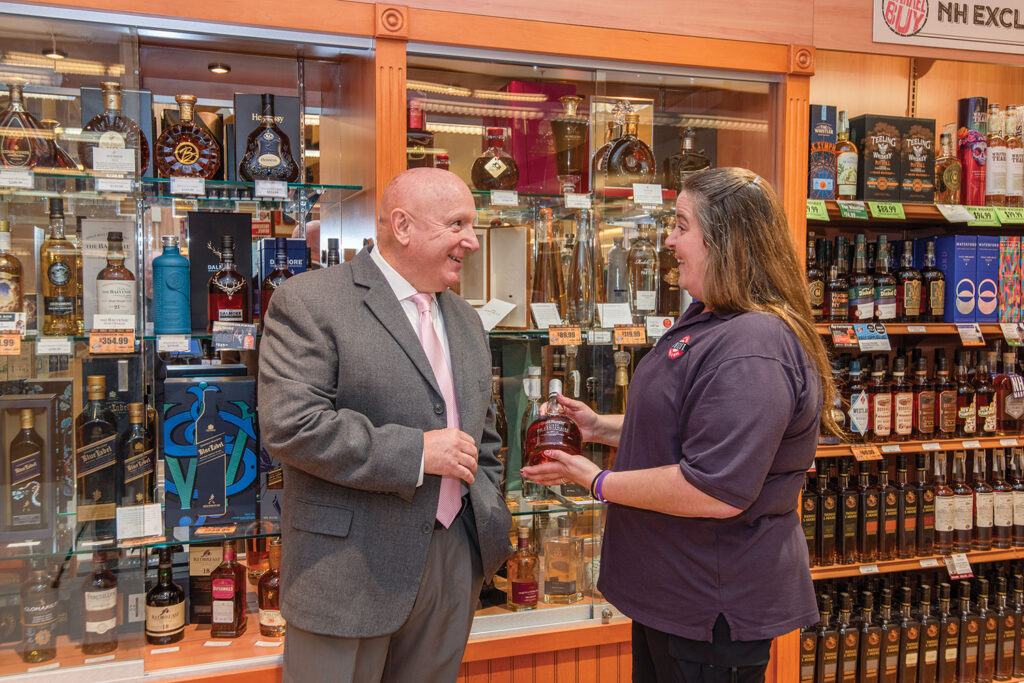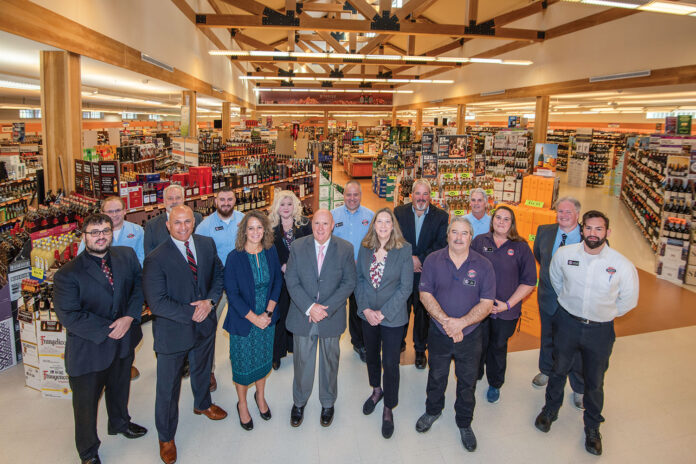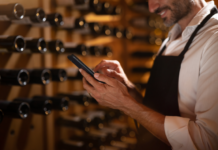The New Hampshire Liquor Commission (NHLC) toasts nine decades of operations in 2024 with a yearlong campaign named “90 Years of Cheers.” It’s a fitting title for a control organization that’s much celebrated by industry peers, New Hampshire residents and the streams of tourists who flow into Granite State and frequent its world-class stores.
Live in New England and you likely think of New Hampshire for three things: skiing, gorgeous mountains and lakes, and NHLC stores that are as well stocked and priced as they are beautifully designed. But these shops, while always boasting low prices thanks to the state’s lack of a sales tax, were not always known for their aesthetics. Much the opposite. As recently as the 2000s, even the largest and most popular NHLC outlets — those off the highways en route to the tourist areas — had the appearance of a rest stop store.
That all changed in the 2010s. NHLC Chairman Joseph Mollica was appointed to the commission (then a three-person body) in 2010 and began serving as its chairman in 2011. A year later, he started an ambitious project that redesigned the state stores — an enormous success that resonates today.
Redesigning the Stores
Before becoming chairman, Mollica was a licensee in New Hampshire. He operated restaurants in the state for many years. One of his customers was a state senator, with whom Mollica shared his frustrations with the NHLC. This included Mollica’s difficulty tracking down fine wines, which required that he drive to a store farther away from his local location, an annoying, time-consuming task for a busy businessman.
In turn, that state senator introduced Mollica to former Governor John Lynch. The governor listened to Mollica, and later tapped the restaurateur to join and then lead the NHLC. “He told me that he wanted me to run the commission like it was my business,” Mollica recalls.
Any successful business requires good branding. Here, the NHLC was in dire need of a redo. “I took off creating a new look and feel,” Mollica says. “I started with the worst stores we had, and that was a lot of them.”
This rebranding included natural elements of the state. The new look leaned heavily on granite — fitting for the Granite State — along with planks and beams that reflected New Hampshire’s woodland culture and environment.
“We also made our stores cleaner, brighter, with more open space,” Mollica says. “Now they feel much more welcoming to female consumers.”
This mirrors an evolution undergone by much of the industry back in the 90s (perhaps indicating how far behind the NHLC was before Mollica). Liquor stores had been dark, dingy, and did not necessarily appear safe or family friendly. Better layouts and lighting changed that perception — a welcome development at the NHLC.
“Customers should never feel unsafe,” Mollica says. “Our stores are so well lit now, with open spaces. Every store has video cameras; everyone is safe.”

This strategy extends to another major demographic of the NHLC.
“We get a lot of business from out of state; we know that represents 50% of our 12 million annual customers,” Mollica says. “We’re always trying to find innovative ways to attract these customers into our state.”
Part of the rebranding process included changing state laws, so that landlords and business partners could more easily and affordably invest in property changes. The NHLC worked with New Hampshire politicians to change the stores’ leasing agreements, for instance.
The landlords and business partners “pay for those renovations,” Mollica explains. “Then we pay them back per square foot as terms of the lease. And the legislator allows us to pay more per square foot than the old cap. The old commission had its hands tied by what it could spend. And now we can do 20-, 25-year leases. Our partners can get long-term leases.”
“Our relationship with landlords is important,” he adds. “We do not use state funds to build stores. That’s what flipped it. We’re no longer a two-year budget cycle away from asking for more money.” Now, the NHLC can operate nimbly with its business partners.
Unsurprisingly, these big changes met resistance from landlords and lawmakers at first. “Before, people didn’t want their liquor stores to change,” Mollica says. “But after six, seven, eight of these were done, people realized they were great stores.”
“When people stopped asking, ‘Please don’t change my store’, and began asking, ‘When are you going to change my store?’, that’s when we knew this had worked,” he adds.
Beyond rebranding, Mollica never lost sight of the licensee dissatisfaction that had led him in the direction of the chairmanship in the first place.
“All this stemmed from me being a licensee that wasn’t able to get the wines I wanted, when I wanted,” he recalls. “Now we sell to any consumer in any store anything they want, and in any amount they want.”
Giving Back to the Public
NHLC customers during Mollica’s tenure have also enjoyed improved communications in how the commission aids state residents.
“We don’t have working capital from the money we make. All our profits go into the general fund,” Mollica explains.
Educating consumers about this fact is key. For instance: what is a “general fund”? Many folks have no idea what this governmental budgeting tool is, or how it helps them. Or another question: Why run a control model versus a privatized alcohol industry? These are important questions to answer for the public to make them understand and appreciate what they have in the commission.
Moreover, New Hampshire — particularly for a small state — has an unusually large legislature. The state’s House of Representatives seats an astounding 400 members from 203 districts, with tons of turnover. Quickly and efficiently teaching all these politicians about the benefits of the NHLC is critical.
Working with the Manchester-based communications firm Montagne Powers, the NHLC has created a video about the financial advantages of its control model. Education, natural resources and public healthcare all receive funds from the NHLC, for instance.
“The video provides an amazing visual for people,” Mollica says. “That way, people can finally understand where the money goes.”
“One thing we want people to know is that we take this responsibility seriously,” he adds. “We try to run the most efficient business we can run.”
Safe Alcohol Practices
Like any control organization, the NHLC must conduct business while also regulating alcohol and maintaining public safety.
“It’s a delicate business,” says Mollica. “We work with local and state police, and have our own great law enforcement team that specializes in liquor enforcement.”
The commission’s Division of Enforcement & Licensing has developed an outreach platform to interact with New Hampshire youth. The division attends outreach events throughout the year, including driver’s educational classes, college hockey games, baseball games and a variety of other public safety and community events, reaching more than 120,000 people each year.
“At the same time, we’re not heavy handed,” says Mollica. “We make sure we try to understand the needs of the licensees. We have great relationships with our licensees. I can’t tell you how much that has changed over the years. We have to make sure that our licensees can stay in business and keep their staff employed and make money.”
To that end, the NHLC Division of Enforcement and Licensing has added the word “Education” to the sign outside their building, explaining the full extent of their duties.
“They offer education to licensees, servers and bartenders,” Mollica says. “It’s a third arm of what they do but it’s a very important part of what they do.”
The division regularly hosts free trainings to give on-premise owners and staff, and NHLC employees, the tools and resources to help make sure customers do not abuse alcohol. These trainings also provide servers and bartenders with an understanding of their individual responsibilities in serving customers alcohol, such as learning how to check identification and spot fake IDs.
The NHLC also encourages safe drinking practices through several statewide programs. In partnership with Brown-Forman, the commission hosts an annual Live Free & Host Responsibly program. Launched in 2015, this promotes responsible alcohol service and consumption through educational videos, events and other information.
Teaching proper serving amounts is one part of the program, as are instructions on how to make low-ABV drinks and mocktails. “We take that responsibility message seriously, and so do they,” says Mollica, thanking the program partner, Brown-Forman.
To the latter, the NHLC has leaned into mocktails for another collaboration with Brown-Forman: Mocktail Month, held during Dry January. Begun in 2021, this has grown into 70 participating licensees who run mocktail specials.
“We partner with the licensees by giving them a 15% off discount up to $10,000 that they can use throughout the year,” Mollica says. “This shows licensees that we are in it for the greater good.”
While mocktails have become popular during Dry January, “so many restaurants now have them on the menu all the time,” Mollica adds. “We never saw that years ago. Now they’re a big part of the alcohol business.”
With the environment in mind, the NHLC recently launched another beneficial program. Once again in tandem with Brown-Forman, the commission urges customers and licensees to bring back empty glass bottles to increase recycling.
Appropriately named “Bring Back Jack,” this program started last year. Customers can bring in at least 12 empty glass wine or spirits bottles to certain outlets and receive $25 off a purchase of $150 or more. Licensees can bring in at least 107 empty glass bottles (an ode to Jack Daniel’s Old No. 7) to receive 10% off an in-store purchase, up to $10,000.
The idea came from the glass shortage during the pandemic. A win-win, it helps producers reuse glass while also being environmentally friendly. The result was 36,000 pounds of glass returned last year, all of which helped generate new bottles.

90 Years of Cheer
The NHLC first opened its doors in August of 1934. Nine decades later, the commission celebrated this anniversary with its “90 Years of Cheers” campaign.
This year-long campaign offers customers the opportunity to win high-value prizes, including 90% off in-store coupons, VIP concert packages, an outdoor kitchen remodel, tickets to the Daytona 500 and NHLC gift cards. Customers can also receive special discounts on their favorite brands.
“It’s a good time to be in the liquor business, and we thought we’d give something back to the consumers,” says Mollica. “I’m a Yankee at heart; if there’s a deal to be had, I want to be a part of it. A lot of consumers feel the same way that I do.”
One deal: When customers spend $90 or more at select NHLC outlets, they get the chance to receive 90% off in-store coupons; NHLC gift cards valued at $10, $50 and $100; and prizes such as Chateau Ste. Michelle-branded Bluetooth speakers, NLHC swag and more. In addition to their winnings, customers will also be automatically entered to win a bi-monthly grand prize, which includes items like a four-season package at Loon Mountain, a VIP Hampton Beach Casino Ballroom concert package, $400 worth of Live Nation concert vouchers, Boston Bruins tickets and jerseys, an outdoor kitchen makeover and more.
Brand teams travel to select outlets twice a month, giving customers statewide the opportunity to take part in the program. Every customer that spends $90 can also enter to win one of the grand prizes by submitting a copy of their receipt online at 90yearsofcheers.com.
In addition to these prizes, customers can also purchase limited-edition products and enjoy special pricing on items like Grey Goose Northern Lights, Caymus Napa Valley Cabernet Sauvignon, Maker’s Mark Kentucky Straight Bourbon Whiskey, Jameson Black Barrel Irish Whiskey and more.
“90 years is pretty special,” says Mollica. “People in the state really appreciate the liquor commission and the evolution of it.”
“We’re grateful for the recognition,” he adds, “but the most important thing is making sure that New Hampshire remains a great state and that the liquor commission remains part of it for many years to come.”
Kyle Swartz is editor of StateWays magazine. Reach him at kswartz@epgmediallc.com. Read his recent piece, The State of American Whiskey in 2024.












